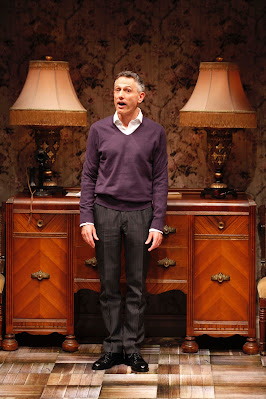To My Girls / Take Me Out (c) Second Stage promos
"New York is my Personal Property and I'm gonna split it with you." I review mostly movies and New York theater shows. I am also an awards prognosticator. And a playwright.
▼
Thursday, April 28, 2022
Sunday, April 24, 2022
Broadway Review: "Funny Girl" Was Never a Great Musical, but With the Exceptional Beanie Feldstein as Fanny Brice, Who Cares?
Funny Girl (c) Matthew Murphy
Broadway Review: Funny Girl
On Broadway at the August Wilson Theatre
Premise: For a show as famous as “Funny Girl,” most people have never seen the actual stage show that made Barbra Streisand a star. The problem is that expectations are insanely high for whoever takes on the title role of Fanny Brice, the real-life, early 20th-century Broadway and vaudeville performer. There have been many smaller productions around the country over the years, and names like Lea Michelle, Debbie Gibson, Lauren Ambrose and Jesse Mueller have been dropped as possible Broadway Fannys. The actress to head the first major revival was British actress Sheridan Smith in the West End in 2016, directed by Michael Mayer with a revised book by Harvey Fierstein from Isobel Lennart’s original, which I was fortunate to see. After many delays and a pandemic, Mayer’s slightly tweaked “Funny Girl” is finally on Broadway where she belongs, almost six decades since the musical first premiered. Fanny, now in the hands of Beanie Feldstein, is a dreamer living in Brooklyn with her mother (Jane Lynch) when her stage career takes off with the help of her friend Eddie (Jared Grimes). At the Ziegfeld Follies, she meets Nick Arnstein (Ramin Karmloo), a handsome but chronic gambler, and after many stops-and-starts, they fall in love and marry. While Fanny’s career flourishes, Nick’s luck runs out, including plans to open a casino in Florida and other schemes that get him in trouble with the law. But will Fanny, whose motto is to not to let anything “rain on her parade,” be able to survive Hurricane Nicky?
Friday, April 22, 2022
Film Reviews: Korean Action "Spiritwalker" is Bonkers Fun, "Petite Maman" is a Sweet Short Story and "Apollo 10½" is Effective American Nostalgia.
Spiritwalker (c) Well Go USA Entertainment
Film Review: Spiritwalker
On Demand Streaming and Blu-Ray
Leave it to the homeless man to speak the truth about the plot of Yoon Jae-geun’s “Spiritwalker”: “I’ve seen all sorts of shit in my life. But, this is the craziest shit I’ve ever seen.” The homeless man (Park Ji-hwan) plays an integral role in a story that feels part “Memento,” a lot of HBO’s “The Tourist” and a dash of Marvel’s “Moon Knight.” Kang I-an (Yoon Kye-sang) or Ian as everyone calls him, is a man with an identity problem – he is brought to a hospital with a gunshot wound and no memory after a car accident. The only thing Yoon gives us as a hint to Ian’s personality disorder is that whenever he looks in a mirror, he sees a different reflection. But before he can even try to figure out who he is, his reality collapses on itself and he becomes an entirely different person, now at lunch in a restaurant. When he finally meets up with the homeless person (who was at the site of the car accident), the two try to figure what’s going on, who is the woman (Lim Ji-yeoh) Ian keeps having visions of and why are people trying to kill him. I have always been an admirer of auteur Korean directors like Bong Joon-ho (“Parasite”), Lee Chang-dong (the excellent “Burning”) and Park Chan-wook (“The Handmaiden”), but I have never really gotten into the horror or action genre of Korean cinema like “The Train to Busan” or this movie. But I had a fun time with “Spiritwalker” mostly because of the unique mystery of Ian and his condition. And when the movie is done, you might essentially understand what happened; it’s only on second watch do you get the artistry of the plot (when he finds himself at that lunch, pay attention to the woman he’s with). The plot is bonkers. Suffice it to say, the condition is not just brain trauma from a car accident. Yoon gets points for being stylish, especially how he represents Ian’s condition. The film premiered in the U.S. at the 2021 New York Asian Film Festival where it won the Award for Excellence in Action. Well deserved. It is no surprise that Hollywood has already optioned this for a remake. I can see Ian being played by Ryan Gosling, Yahya Abdul-Mateen II or (as a nod to its Korean roots) Steven Yuen. Anyone but Jared Leto. Until the American remake, take a chance on the crazy, funhouse ride of the original.
Tuesday, April 19, 2022
Theater Reviews: "Citizen Wong" Dramatizes a Shameful Moment in American History, James McAvoy's "Cyrano" is Not Quite on The Nose, and a Life is Examined in Broadway's "Birthday Candles"
Citizen Wong (c) John Quincy Lee
Theater: Citizen Wong
Pan Asian Repertory Theatre at A.R.T. New York
If you enjoyed the HBO drama, “The Gilded Age,” but wondered where all the Asian people were, please consider “Citizen Wong,” the new play by Richard Chang at the Pan Asian Repertory Theatre, your addendum to the show. At the same time (the late 1800s) the rich, white, socialites were moving uptown in Manhattan, and the more influential blacks were populating Brooklyn, the Chinese men who had helped to build the national railroad had settled into Chinatown and were being targeted by politicians. Eventually, President Charles Arthur passed the Chinese Exclusion Act, which halted Chinese immigration and, according to the play, deporting the “undesirable” ones who were already here. Leading the fight was Wong Chin Foo, an educated lecturer and ultimately the founder of the first Chinese and English newspaper in New York. As portrayed by Whit K. Lee, he is charismatic and acerbic, and in Chang’s script, Chin Foo makes a lot of points that modern audiences will find very familiar with references to Anti-Asian hate crimes as well as using these perceived outsiders as convenient political targets. The play paints a wide canvas of history which may need the budget of an HBO to make work. As much as directors Ernest Abuba and Chongren Fan and the hard-working cast try, the play feels grounded when it should soar. Still, there’s a lot of informative background given and if the purpose of the play is to highlight the injustices in history, it succeeds handily. Ironically, the most effective part of the epic story is the intimate romance between Wong and Eliza Stanhope (Malka Wallick), a rich heiress who is sympathetic to his cause, especially since those scenes are so well-played by Lee and Wallick. May I suggest Julian Fellows hire Chang to help write for the second season of “The Gilded Age” where black journalist Peggy Scott crosses paths with Wong Chin Foo, maybe played by Harry Shum Jr. or Simu Liu. Wong Chin Foo (no relations) and his intriguing story would be quite the revelation in both the gilded and shameful history of New York City.
Wednesday, April 13, 2022
Theater Reviews: What Defines Theater? The One-Man “The Patsy,” the Collective Voice of “Oratorio for Living Things” or the Huge Cast of Broadway’s “Paradise Square?”
The Patsy (c) Carol Rosegg
Theater Review: The Patsy
By Transport Group at Abron Arts Center
It is an understatement to say that David Greenspan is an acquired taste. As a playwright, director and mostly as an actor, Greenspan puts a unique spin on every project he takes. He plays the small role of a butler in a Broadway show, and then creates a one-man mini show about that character. It’s just how his mind works. Here, his brilliant and idiosyncratic mind has adapted “The Patsy,” a three-act play from 1925 (later made into a 1928 film with Marion Davis), into a whirling dervish of a solo play where he plays all the parts. Now the uninitiated, who after ten minutes realizes this, will think: “Is he going to play all the parts for an hour? Oh my God!” While fans (or as we like to call ourselves, the converted) will think: “He’s going to play all the parts for an hour. Oh. My. God!” The Barry Connors play itself is a family drawing room comedy in which two sisters’ rivalry in the pursuit of love threatens to tear their family apart. And, while it’s not a particularly memorable play, in Greenspan’s hands in collaboration with director Jack Cummings III, it becomes hypnotic with all the characters well-delineated through his goofy, exaggerated style. Even the uninitiated will at least admire the bravery of this approach, while the converted will wish he would do a different creaky play from the past every season. (Note, Greenspan’s next project is his take on Gertrude Stein’s “Four Saints in Three Acts” in Brooklyn.) I first saw Greenspan in 1991 in his own play, “Dead Mother, or Shirley Not All in Vain,” in which he played a man who must inhabit the spirit of his dead mother, and I was confused by his approach as much as I was tickled by the audacity of it all. And those who saw his Harold in “The Boys in the Band” or him singing “Over the Rainbow” in Terrance McNally’s “Some Men” will “Shirley” consider Greenspan’s performance style as a sort of rare singularity. He first performed “The Patsy” in 2011, which I saw and liked but not as much as I did this time around in 2022. It feels deeper somehow. I can’t wait to see what he’ll bring to the piece in 2033.
Thursday, April 7, 2022
Film Review: “Better Nate Than Ever,” “The Invisible Thread” and “Maybe Someday” are Complex Gay Films in These Times of Political Attacks
Better Nate Than Ever (c) Disney+
Better Nate Than Ever
Streaming on Disney+
The word gay is never uttered in reference to our hero Nate, in Tim Federle’s wonderful movie adaptation of his own novel, “Better Nate Than Ever,” but boy, do we know. And hopefully every teacher in Florida can see that not saying someone is gay doesn’t mean you can’t also be the gayest thing since Lady Gaga showed up at the Oscars with Liza Minnelli. Speaking of the Oscars, “Better Nate Than Ever” is “CODA” for the “POTA” (Parents of Teen Actor) crowd. This, of course, is a fairy tale (all puns intended) of a Pittsburgh middle schooler named Nate Foster (Rueby Wood) who has dreams of being a big Broadway actor but unfortunately wasn’t even cast in the lead of the school musical, “Lincoln: The Unauthorized Rock Musical” (don’t ask). So, when his best friend Libby (Aria Brooks) informs him that there’s an open call audition for a “Lilo and Stitch” musical (this is Disney+, after all), it only takes a little deception and a lot of luck for Nate and Libby to be on a bus to New York City (and while it’s not the kind of “Guys and Dolls” New York that Nate dreams it is, it’s still a PG version). And, with the help of a distant aunt (a game Lisa Kudrow), Nate finally gets a chance to live his dream. Again, realism is out the door, but it sure is a fun ride. The movie rests on the shoulders of young Rueby Wood, and it is because of him that the movie works so well. He plays Nate with optimism and flair and Federle doesn’t go overboard on the gay signifiers, although to start the movie with a bedroom Wicked poster and Nate’s gold, glitter phone case could be considered slightly over this side of board. While technically not a musical, the movie does have a couple of new songs (one for Nate’s fantasy, another for the “Lilo and Stitch” musical), and for as many times we hear George Benson’s “On Broadway,” he might as well show up in the movie (no spoilers here). That “On Broadway” sequence is pure Disney schmaltz and while I will allow it for plot purposes, even in a movie about dreams, that’s almost a bridge too far. The only really unbelievable moment in the vibrant and enjoyable movie is when the casting director (Brooks Ashmanskas) states: “I’ve never had a boy sing ‘Let It Go’” in an audition. Honey, no way that’s true.
Friday, April 1, 2022
Theater Reviews: "The Chinese Lady," the Irish of "A Touch of the Poet" and the Hookers of "The Life" Try to Survive Their Versions of America
Reviews: The Chinese Lady, A Touch of the Poet, The Life
The Chinese Lady (c) Joan Marcus






